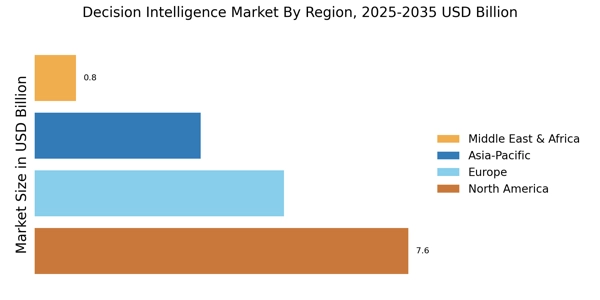Emergence of Predictive Analytics
The emergence of predictive analytics is reshaping the landscape of the Decision Intelligence Market. Organizations are increasingly leveraging predictive analytics to forecast trends and behaviors, thereby enhancing their decision-making capabilities. The predictive analytics market is projected to grow to USD 10 billion by 2025, highlighting its significance in driving business strategies. By utilizing historical data and advanced algorithms, decision intelligence tools can provide organizations with foresight into potential outcomes, enabling proactive decision-making. This capability is particularly valuable in sectors such as finance, healthcare, and retail, where timely and informed decisions can lead to competitive advantages. As the demand for predictive analytics continues to rise, it is likely to serve as a catalyst for growth within the Decision Intelligence Market.
Rising Demand for Data-Driven Insights
The Decision Intelligence Market is experiencing a notable surge in demand for data-driven insights. Organizations are increasingly recognizing the value of leveraging data analytics to inform strategic decisions. According to recent estimates, the market for data analytics is projected to reach USD 274 billion by 2025, indicating a robust growth trajectory. This trend is driven by the need for businesses to enhance operational efficiency and improve customer experiences. As companies strive to remain competitive, the integration of decision intelligence tools becomes essential. These tools enable organizations to analyze vast amounts of data, identify patterns, and derive actionable insights, thereby facilitating informed decision-making processes. Consequently, the rising demand for data-driven insights is a pivotal driver in the Decision Intelligence Market.
Increased Investment in Digital Transformation
Investment in digital transformation initiatives is a key driver of the Decision Intelligence Market. Organizations are increasingly allocating resources to modernize their operations and enhance their technological capabilities. The digital transformation market is expected to reach USD 2 trillion by 2025, reflecting the urgency for businesses to adapt to changing market dynamics. Decision intelligence plays a crucial role in this transformation by providing insights that guide strategic planning and operational improvements. As companies embrace digital tools and platforms, the integration of decision intelligence solutions becomes vital for optimizing processes and enhancing decision-making efficiency. This trend indicates a strong correlation between digital transformation efforts and the growth of the Decision Intelligence Market.
Growing Focus on Risk Management and Compliance
The Decision Intelligence Market is witnessing a growing emphasis on risk management and compliance. Organizations are increasingly aware of the importance of adhering to regulatory requirements and managing potential risks effectively. The Decision Intelligence Market is projected to reach USD 14 billion by 2025, underscoring the critical need for robust decision-making frameworks. Decision intelligence tools facilitate the identification and assessment of risks, enabling organizations to make informed choices that align with compliance standards. This focus on risk management not only helps in mitigating potential threats but also enhances organizational resilience. As businesses navigate complex regulatory landscapes, the demand for decision intelligence solutions that support risk management is likely to escalate, further driving growth in the Decision Intelligence Market.
Advancements in Artificial Intelligence Technologies
Technological advancements in artificial intelligence are significantly influencing the Decision Intelligence Market. The rapid evolution of AI technologies, including machine learning and natural language processing, is enabling organizations to automate complex decision-making processes. As of 2025, the AI market is anticipated to surpass USD 500 billion, reflecting the increasing adoption of AI solutions across various sectors. These advancements allow for enhanced predictive analytics, which can lead to more accurate forecasting and improved business outcomes. Furthermore, the integration of AI into decision intelligence platforms is streamlining operations and reducing human error. This technological evolution is likely to propel the growth of the Decision Intelligence Market, as organizations seek to harness the power of AI to drive efficiency and innovation.


















Leave a Comment